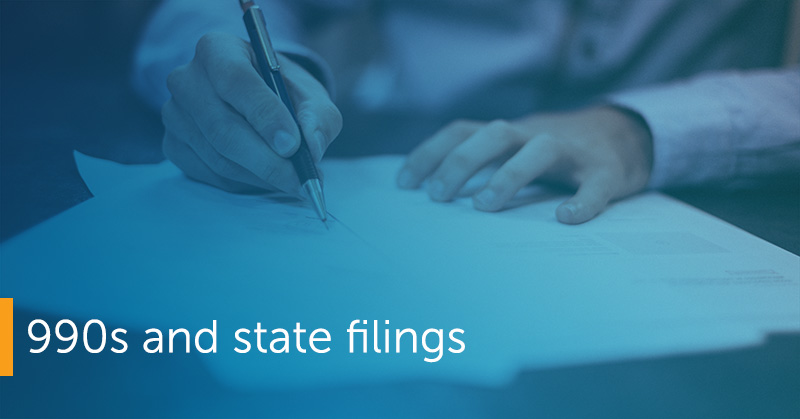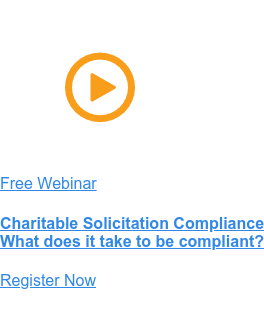-
Software
Compliance Software
Businesses and nonprofits can oversee licenses, track renewals, access documents, and more from a single interface.
Software OverviewSoftware Features -
Services
Compliance Services
Full service compliance solutions for organizations throughout their entire lifecycles.
Business Overview Nonprofit Overview -
Industries
Industry Services
Specialized licensing services for organizations in highly regulated industries.
General BusinessIndustries - Information Center
Coordinating 990s and Fundraising Registrations
Most state charitable solicitation registration renewals are due in some relation to the IRS Form 990 deadline. Because a copy of Form 990 is required in nearly every state to renew, aligning the deadlines makes sense, at least theoretically.
Organizations, particularly those registering nationwide, are tasked with completing their annual return and then immediately submitting registration renewals with each state. For any nonprofit, these logistics can present a challenge. Organizations that file Form 990 on the final possible day simply cannot meet the corresponding deadlines with many states, regardless of who prepares their state registrations.
Below, we explore the relationship between IRS 990 and charitable registration deadlines. Whether you’re part of a nonprofit organization or an industry practitioner, we’ll explain why the proactive filing of Form 990 is essential to ongoing state compliance.
Harbor Compliance provides nationwide charitable registration services. We help organizations meet the varying deadlines and requirements of each state.
Understanding the Form 990 Deadline
501(c)(3) organizations are required to file Form 990 to maintain their federal income tax exemption. Regardless of whether the type of return (i.e., Form 990, 990-EZ, or 990-PF), the return is always due four months and fifteen days after the end of the organization’s tax year. For example:
- An organization with a tax year ending December 31, 2020, has a Form 990 deadline of May 17, 2021*.
- An organization with a tax year ending June 30, 2021, has a Form 990 deadline of November 15, 2021.
Organizations that cannot meet the original IRS deadline can request a 180-day extension by submitting Form 8868.
* Ordinarily, the deadline is May 15, but in 2021, this day falls on a weekend.
Deadlines for Charitable Registration Renewals
Each state’s charitable registration deadline varies but typically fall into one of three categories:
- Due on the anniversary of initial registration, e.g., Florida.
- Due on a fixed date for all organizations, e.g., Maine.
- Due in some relation to the organization’s tax year end, e.g., Arkansas or California.
Logistically speaking, the states with deadlines falling on the original Form 990 due date present a particular sticking point. While this list can vary by organization, these states may include:
- California
- Hawaii
- Kentucky
- Massachusetts
- Mississippi
- New Hampshire
- New York*
- North Carolina
- Ohio
- Oregon
- South Carolina
- Virginia
Several more states have reporting deadlines based on the organization’s tax year end but give slightly more time to file. For example, New Jersey and Illinois require the renewal filing six months after the end of the year. And, states like Pennsylvania automatically build a 180-day extension into their due dates.
** New York recently introduced a second renewal filing requirement with the Department of State. Many organizations must now file with two separate agencies.
State Charitable Registration Extensions
Most states have procedures for extending their original filing deadlines. Many times, a copy of Form 8868 is required. In all cases, organizations must submit extension requests on or before the deadline for the registrations to remain in good standing.
Organizations that extend their Form 990 have little choice but to extend with each state. This goes a long way to protecting its registration status and the accompanying ability to solicit. If the organization manages state registrations on its own, this also creates an extra round of filings each year with new deadlines to track.
As part of our charitable registration service, we track state-specific deadlines for our client organizations. We prepare and file the state-level extensions needed to maintain active registrations.
Time Is of the Essence
Whether or not an organization files a federal extension, there is a tremendous advantage to filing 990 before the federal deadline.
Most notably is the ability to maintain good standing with state charity officials. This not only preserves the organization’s right to solicit but also fosters a sector of trust and transparency. After all, donors, funders, and stakeholders can research an organization’s registration status at any time.
Additionally, many states assess a late fee on renewal filings received even a day late. While the fees are usually modest (less than $100), those fees could otherwise be used in furthering any element of the organization’s mission.
There’s a human element, too. Whether your organization manages its state registrations in-house or outsources them to a compliance provider, you can save the last-minute rush to gather information, prepare forms, and contact executives for signatures.
We recognize that some nonprofits may find it difficult to file Form 990 sooner because of existing controls and procedures. We encourage those organizations to start a conversation with their board, CPA, and legal counsel as needed and review their situation. In all cases, a proactive approach goes a long way to maintaining fundraising compliance.
Harbor Compliance is a nationwide provider of charitable solicitation registration services and software. We work with our clients and their CPAs and tax preparers to help them stay ahead of critical deadlines.
Learn more about our solutions by clicking the link below.






